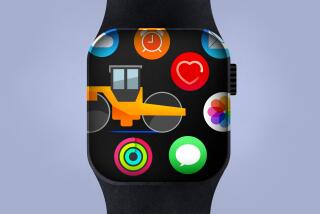Computer Firms Have Much at Stake as New PCs Debut
- Share via
It’s new-model season again for the two most watched, most talked about, most fussed over personal computer makers in the Silicon Valley: Apple Computer and Next Inc.
But this year, new models from these two media darlings will not be mere examples of the latest and greatest of their PC technology. What’s at stake is renewed corporate strength--or, in Next’s case, corporate survival.
For Next, the critical task is bringing out new models that more customers are willing to buy and more software publishers are willing to create programs for. Analysts agree that company founder and PC pioneer Steven P. Jobs faces a “bet your business” crossroads.
“This is the last shot for him,” said William Zachmann of Canopus Research in Duxbury, Mass. If the new machines are “anything less than a minor miracle, the Next machine won’t amount to much more than an exotic footnote in computer history.”
For Apple, the challenge is responding to persistent criticism that it has no low-cost, entry-level systems.
“Apple needs something to capture the excitement of customers . . . to give them what they say they have been wanting,” said Richard Shaffer, a technology analyst and PC newsletter publisher in New York. “But it still remains to be seen whether the customers still care after they get what Apple has to offer. It may not be enough.”
The new machines and sharpened corporate strategies hardly come at an ideal time. Personal computer sales rates in the United States have slowed dramatically during the past year, intensifying competition and sparking a price war led by giant International Business Machines. Meanwhile, European sales growth, which had been offsetting the stagnating U.S. market, has tapered off.
Although overall market conditions have not been kind to Apple, the company has brought on some of its own problems, analysts say. It has concentrated on the high-priced, turbo-powered end of the PC market and ignored less expensive, entry-level systems--including models for the schools, once the company’s most important market.
Aimed at squelching that criticism, Apple’s new-product introduction in October will include three new versions of its popular Macintosh line, analysts say. The new systems, about which the company declines to comment, will include a replacement for the mainstay Macintosh Plus, a new color Mac and a scaled-down version of its most popular high-powered system, sources say.
Although prices have not been set, sources promise that the new Macs will be considerably less expensive than current models--among the highest-priced PCs on the market.
“Apple is filling in a significant gap in its product line,” explains Bruce Stephen of International Data Corp., a Framingham, Mass., market research firm. “This is not a do-or-die situation for them, but it is important if they are going to get back into the hunt.”
Next Inc., Jobs’ floundering 5-year-old company, is set to show off his latest system Sept. 18 in the Louise M. Davies Symphony Hall in San Francisco. That’s the same 3,000-seat auditorium that Jobs packed with a standing-room-only crowd two years ago when he unveiled the initial Next machine.
This year Jobs will show off new models that are faster, less expensive and equipped with color monitors. And, in a major reversal of earlier company policy, one or more of the machines will employ floppy disk drives. The initial machines were equipped only to handle optical disks, expensive devices that software publishers balked at using to distribute their programs.
Further, and perhaps more important, company insiders promise a host of new software programs--a development that would give the machines, now priced at $10,000, some sorely needed practical applications.
Next, a privately held company, has declined to reveal its sales rates, saying only that its largest sale consisted of 275 machines to the William Morris talent agency in Hollywood and New York. But analysts estimate that the company has sold 2,000 to 5,000 units.
Analysts agree that Next’s sales have been slowed by the lack of software written for its machine, which cannot use programs developed for other models. However, analysts wonder if the new programs promised for release later this year will even make a difference.
“The problem is that there is no task for which the Next is the best choice,” Shaffer says. “While the machine may be nice and elegant, those benefits aren’t enough to get customers to abandon what they already have.”
Analysts are uncertain about what Jobs might do if his updated machines prove as lackluster at the cash register as his initial version. Jobs isn’t likely to fold the company entirely, several analysts said, because so much of his reputation is at stake.
Possible options include selling the company’s technology, possibly to its Japanese investor, Canon Inc., or working some other deal to change the firm’s focus.
“For Jobs, it’s more ego than business,” said Stewart Alsop, a Silicon Valley technology analyst. “Jobs will find a way to make the company a success.”
Jobs declined to be interviewed for this story, preferring to wait until the new models are formally unveiled.
Meanwhile, in other PC news, IBM said Tuesday that it is proceeding with its planned full-scale rollout of its new home computer, the PS/1, after test-marketing it in three areas the past two months.
The new systems, priced between $1,000 and $2,000, will be available nationwide immediately and in selected stores in Canada and Europe next week.






